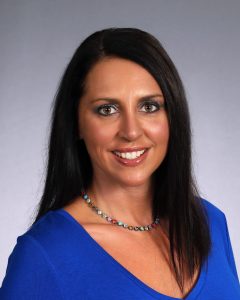ABPS Diplomate Michelle Thompson, DO, On Staying Healthy at Home
 Michelle Thompson, DO, a Diplomate of the American Board of Physician Specialties®, is Chair of Medicine at UPMC Horizon in Pennsylvania and an integrative and lifestyle family medicine physician at Hermitage Community Medicine-UPMC. Here, she offers advice on how to stay healthy at home during the COVID-19 pandemic.
Michelle Thompson, DO, a Diplomate of the American Board of Physician Specialties®, is Chair of Medicine at UPMC Horizon in Pennsylvania and an integrative and lifestyle family medicine physician at Hermitage Community Medicine-UPMC. Here, she offers advice on how to stay healthy at home during the COVID-19 pandemic.
ABPS: What are your concerns about the health of people who must follow stay-at-home orders during the COVID-19 crisis?
Dr. Thompson: It’s important that we try to find stillness during the chaos. In this time of uncertainty, we know one thing is for certain—our breath. We can utilize our breath as a tool for meditation. This practice involves taking in a slow, deep breath and holding it for three seconds. Then, we let it out slowly and completely, releasing the tension from the body. We can perform this practice many times throughout the day. For instance, I do it when I’m washing my hands, which is frequently. Another technique is to repeat a mantra that focuses on the positive. “I am safe.” “I am well.” “I am happy.” “I am going to be okay.” Or we can start the day with conscious gratitude, and perhaps record in a journal all the things in our lives for which we are grateful.
ABPS: How can our lifestyles contribute to maintaining health and wellness at home during the pandemic?
Dr. Thompson: We can use this extra time at home to slow down, focus on self-care, and develop healthy habits. You can create a stay-at-home retreat, for example. By tending to our bodies, learning to quiet our minds, and living in the present moment, we may hopefully emerge from the pandemic better than when we entered.
ABPS: What advice can you give us regarding exercise and nutrition?
Dr. Thompson: From a cardiovascular standpoint, 30 minutes of exercise a day can improve your mood and resilience tremendously. Jumping jacks, sit-ups, a brisk walk—they can all improve your health. If the weather is bad, embrace the elements and go out with an umbrella. Even a 20-minute walk can help us to reset. Eat foods rich in immune-enhancing fiber, Vitamin C, Vitamin A, quercetin, and zinc. You can put lemons or limes in your water, grab a piece of grapefruit or dark chocolate every day, and eat foods like broccoli or brussels sprouts.
ABPS: What about sleep?
Dr. Thompson: A lot of us underestimate the importance of getting a good night’s sleep. It’s helpful to quiet our minds before going to bed. A practice called Yoga Nidra allows the body to relax deeply while the mind stays quietly alert. This helps to deactivate our sympathetic state, or the fight-or-flight state, and moves us into the parasympathetic state of rest and relaxation. Organic nighttime teas and medicinal-strength herbs that don’t interact with medications can also help. It’s also good to develop a sleep ritual, perhaps by warming the room, playing soft music, and using a diffuser with essential oils. It’s been proven that the better we sleep, the less anxiety we experience.
ABPS: What about relationships?
Dr. Thompson: Social distancing doesn’t mean social isolation. Relationships matter. Virtual platforms such as Zoom, Facetime, Messenger, Skype, and WhatsApp can help us organize social events like happy hours and parties. Right now, there are yoga studios and websites helping us keep in touch with each other by streaming exercise sessions into homes for free.
ABPS: Some people are consumed with all the information out there. How do we handle the stress?
Dr. Thompson: We should reach out to people and rely on one another. You shouldn’t think that you’re in this alone. Counseling is available. Call your doctor if you’re having a tough time. Your doctor can use a video platform to help you.
ABPS: How can we continue to practice healthy habits?
Dr. Thompson: Use this time to hit the pause button and think about what really matters to you. Look at yourself and each other with new eyes, with compassion. Having more compassion promotes a feeling of interconnectedness. Ask yourself: Am I loving well? Am I caring for others? Am I caring for our planet?






